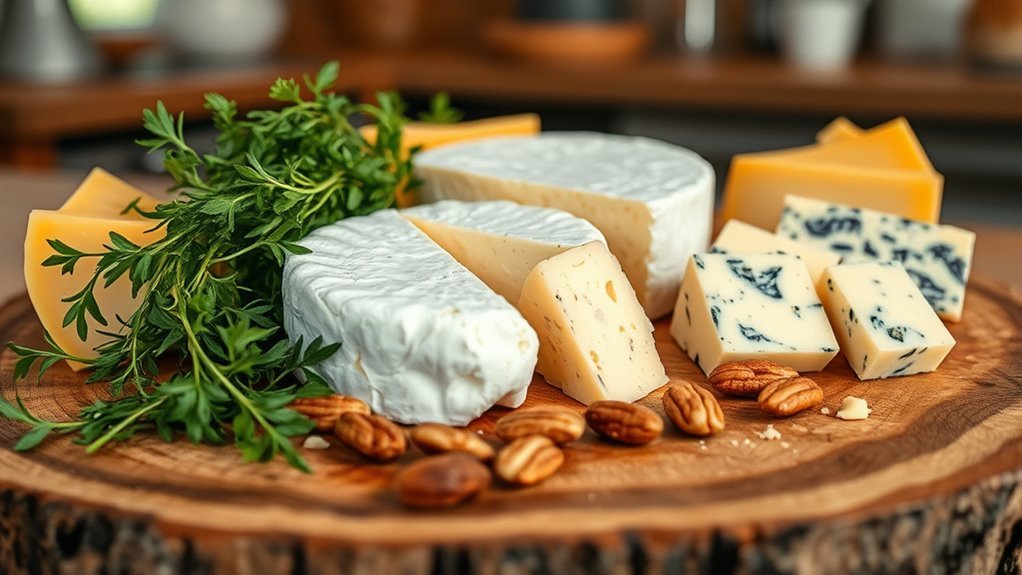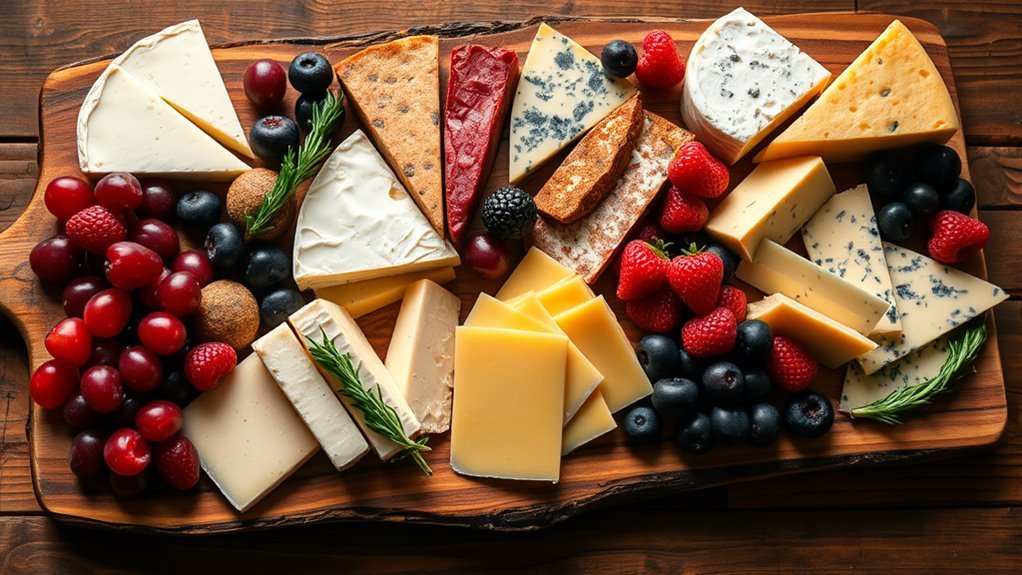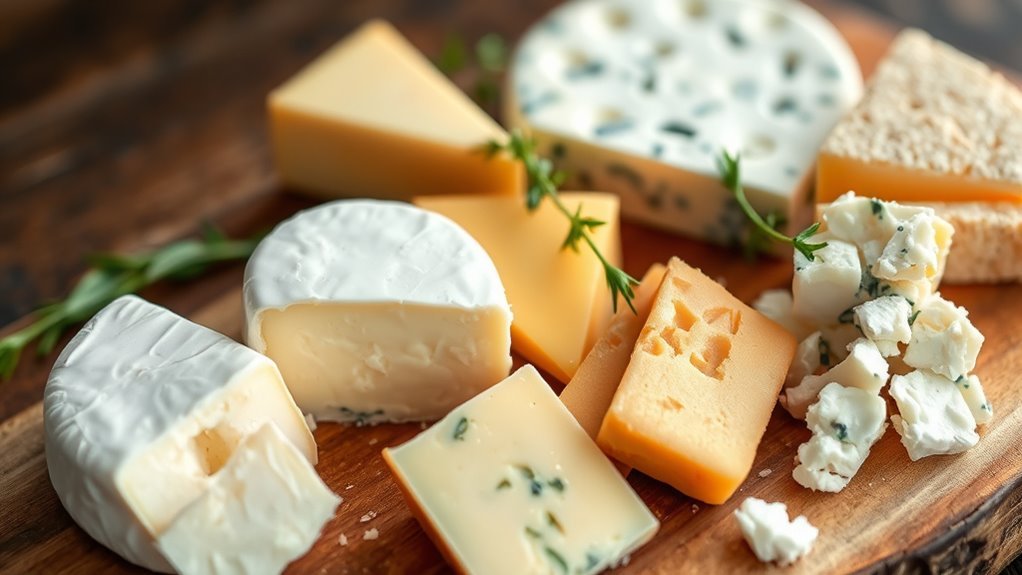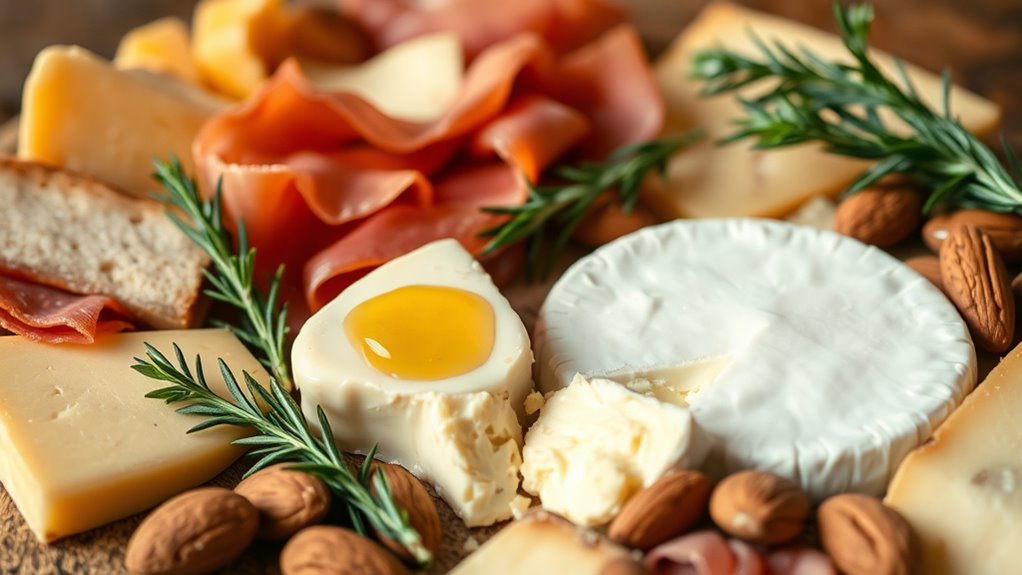Yes, you can have cheese on a keto diet! Cheese is low in carbohydrates and high in healthy fats, making it an excellent choice for keeping your body in ketosis. Many cheeses, like cheddar and mozzarella, contain less than 1 gram of carbs per serving. They also provide protein and essential nutrients that support your overall health. By incorporating cheese into your meals, you’ll add flavor and variety while sticking to your keto goals. Learn more about the best options and delicious recipes.
Understanding the Keto Diet and Its Macros

What exactly does it mean to follow a ketogenic diet? At its core, it’s about embracing keto principles that prioritize high-fat, moderate-protein, and low-carbohydrate intake. This macro balance shifts your body into a state of ketosis, where fat becomes your primary fuel source instead of carbs. By limiting carbs, you’ll encourage your body to burn stored fat for energy, which can lead to weight loss and improved mental clarity. However, it’s vital to guarantee that your fat sources are healthy and nutrient-dense, rather than relying solely on processed foods. Understanding these fundamentals will empower you to make informed choices, allowing you to enjoy the freedom of a ketogenic lifestyle while still prioritizing your overall health and well-being.
The Nutritional Profile of Cheese

When you consider cheese on a keto diet, it’s crucial to look at its nutritional profile, including the macronutrient breakdown, vitamins, and minerals. Different types of cheese can offer varying levels of fat, protein, and carbohydrates, which can impact your overall macros. Understanding these elements helps you make informed choices that align with your dietary goals.
Macronutrient Breakdown
While you might think of cheese primarily as a tasty addition to your meals, its macronutrient profile reveals why it’s a popular choice among those following a ketogenic diet. Most cheeses are low in carbohydrates, typically containing less than 1 gram per cheese serving, making them ideal for maintaining your desired macronutrient ratios. They’re rich in healthy fats, which can range from 20 to 30 grams per serving, providing a satisfying source of energy. Additionally, cheese offers moderate protein levels, around 6 to 10 grams, depending on the type. This balance of fats, minimal carbs, and protein helps keep you in ketosis while enjoying a variety of flavors and textures. Cheese can truly enhance your keto experience without sacrificing nutritional goals.
Vitamins and Minerals
Cheese isn’t just a delicious addition to your meals; it’s also packed with essential vitamins and minerals that can support your health on a ketogenic diet. It’s rich in calcium, which is vital for strong bones and teeth. Additionally, cheese enhances calcium absorption, making the nutrients more effective for your body. The vitamin content in cheese varies, but many varieties provide significant amounts of vitamin A, essential for eye health, and vitamin B12, important for nerve function and energy production. Consuming cheese can help you meet your dietary needs while enjoying tasty flavors. Just keep in mind the type and quantity to maintain your keto goals, ensuring you reap the benefits without overindulging.
Types of Cheese
A variety of cheeses can fit seamlessly into your ketogenic diet, each offering unique nutritional profiles that cater to different tastes and dietary needs. From creamy brie to sharp cheddar, cheese varieties provide options rich in fats while remaining low in carbohydrates. For instance, cream cheese and ricotta are excellent for spreading, while Parmesan adds a delightful crunch to salads. The textures of cheese can elevate your meals; soft cheeses can lend creaminess, while aged varieties can offer a delightful bite. Most cheeses are also high in calcium and protein, which are beneficial on a keto plan. By choosing wisely, you can enjoy the freedom of diverse flavors while adhering to your dietary goals. Cheese truly can be a keto-friendly delight!
Best Keto-Friendly Cheeses

When you’re following a keto diet, selecting the right cheeses can greatly enhance your meals without jeopardizing your carbohydrate limits. Here are some of the best keto-friendly cheese varieties that you can enjoy guilt-free:
| Cheese | Carbs (per 1 oz) | Storage Tips |
|---|---|---|
| Cheddar | 0.4g | Keep in the fridge, wrapped. |
| Mozzarella | 0.6g | Store in water for freshness. |
| Cream Cheese | 1g | Seal tightly to prevent drying. |
| Gouda | 0.6g | Refrigerate and consume within a week. |
These cheeses not only fit your carb limits but also offer rich flavors and textures. Proper cheese storage helps maintain their quality, making your keto meals even more enjoyable.
Cheeses to Avoid on a Keto Diet
While many cheeses are keto-friendly, some varieties can considerably derail your carbohydrate goals. It’s essential to be cautious, especially if you’re aiming for low carb options and managing lactose intolerance. Here are some cheeses you might want to avoid:
- Cottage Cheese: Often higher in carbs than you’d expect.
- Ricotta Cheese: Contains more carbs than other cheese options.
- Feta Cheese: Can add up in carbs when consumed in large quantities.
- American Cheese: Processed and usually contains added sugars.
- Cream Cheese: While versatile, some brands can have hidden carbs.
How to Incorporate Cheese Into Your Meals
Incorporating cheese into your keto meals can be both delicious and satisfying. You can enhance flavors by pairing cheeses with low-carb options like nuts, meats, or vegetables, creating balanced dishes. Additionally, using cheese in cooking—whether melted over a casserole or blended into sauces—can elevate your meals while keeping your carb count in check.
Cheese Pairing Suggestions
Although cheese can be a delicious addition to a keto diet, knowing how to pair it effectively can elevate your meals even further. Combining cheese with other complementary ingredients enhances flavors and keeps your meals exciting. Here are some great pairing suggestions:
- Cheese and wine: Opt for low-carb wines like Sauvignon Blanc or Merlot to enjoy with your favorite cheeses.
- Cheese and meat: Pair hard cheeses like cheddar with cured meats for a satisfying snack.
- Cheese and nuts: Add a handful of almonds or walnuts for texture and healthy fats.
- Cheese and vegetables: Roasted broccoli or sautéed spinach pair wonderfully with feta or goat cheese.
- Cheese and herbs: Fresh herbs like basil or thyme can brighten up creamy cheeses.
These combinations will keep your keto meals flavorful and diverse!
Cooking With Cheese
Cheese can be a versatile ingredient that adds richness and flavor to your keto meals, enhancing everything from simple snacks to elaborate dinners. You can easily whip up delicious cheese sauces, perfect for drizzling over grilled vegetables or chicken. To make cheese snacks, try baking cheese crisps or combining shredded cheese with herbs and spices for a savory treat. Incorporating cheese into your meals not only provides healthy fats but also boosts satiety, making it easier to stick to your keto lifestyle. Experiment with different types of cheese, like sharp cheddar or creamy goat cheese, to find what you love. With cheese, your keto cooking can be both freeing and satisfying, allowing for endless culinary creativity.
Creative Cheese-Based Keto Recipes
When you’re following a keto diet, exploring creative cheese-based recipes can elevate your meals while keeping your carb intake low. Cheese adds flavor, texture, and satisfaction, making it perfect for various dishes. Here are some ideas to inspire you:
- Cheese snacks: Whip up cheese crisps or seasoned cheese cubes for a crunchy treat.
- Cheesy casseroles: Combine your favorite low-carb veggies with a creamy cheese sauce for a comforting dish.
- Cheese dips: Serve a warm cheese dip made with cream cheese and herbs for an indulgent appetizer.
- Gourmet pizzas: Use a cauliflower crust topped with mozzarella and your favorite toppings.
- Stuffed mushrooms: Fill mushrooms with a cheesy filling for a savory bite.
These recipes can keep your meals exciting while sticking to your keto goals!
Tips for Choosing Quality Cheese
Choosing quality cheese can greatly enhance your keto meals, as not all cheeses are created equal. Look for artisan cheese, which often boasts richer flavors and fewer additives. These cheeses are typically made with traditional methods, ensuring better quality and taste. Check the label for minimal ingredients—ideally, you want just milk, salt, and cultures.
When it comes to cheese storage, keep your cheese wrapped in parchment paper or a cheese bag to maintain freshness while allowing it to breathe. Avoid plastic wrap, which can trap moisture and lead to spoilage. Finally, don’t hesitate to sample different varieties; finding your favorites can elevate your keto experience and keep your meals exciting. Enjoy the freedom that quality cheese brings to your diet!
The Benefits of Cheese on a Keto Diet
Incorporating quality cheese into your keto diet offers several benefits that can enhance both nutrition and satisfaction. Cheese not only serves as a delicious flavor enhancer but also provides essential nutrients. Here are some key advantages:
- Health benefits: Rich in calcium and protein, cheese supports bone health and muscle maintenance.
- Nutrient source: Loaded with vitamins A, B12, and K2, it contributes to overall well-being.
- Flavor enhancer: It adds depth to meals, making them more enjoyable without extra carbs.
- Satiety booster: High in fats, cheese helps you feel full longer, reducing cravings for unhealthy snacks.
- Versatility: Cheese can be enjoyed in various forms, from snacks to toppings, keeping your meals exciting.
Embrace cheese for a delicious and nutritious keto experience!
Frequently Asked Questions about Cheese on Keto
1. Can I eat cheese while on a keto diet?
Yes, cheese can be a great addition to a keto diet. Most cheeses are low in carbohydrates and high in fat, making them a suitable option for those following a ketogenic lifestyle. However, it’s important to choose full-fat varieties and monitor portion sizes to ensure you stay within your daily carb limits.
2. What types of cheese are best for a keto diet?
Some of the best cheeses for a keto diet include cheddar, mozzarella, cream cheese, goat cheese, and blue cheese. These options are not only low in carbs but also rich in healthy fats and protein. Always check nutrition labels, as some cheeses may have added ingredients that increase carb content.
3. How much cheese can I consume on a keto diet?
While there is no strict limit on cheese consumption on a keto diet, moderation is key. A typical recommendation is to keep cheese consumption within 1 to 2 ounces per serving, ensuring that your total daily carb intake remains low (generally under 20-50 grams of carbs). It’s also wise to consider your overall caloric intake and dietary balance.
4. Are there any cheeses I should avoid on a keto diet?
Yes, some cheeses are better avoided due to higher carb content. For instance, processed cheeses, such as cheese spreads or certain flavored cheeses, can contain added sugars and carbs. Additionally, cottage cheese and ricotta cheese, while still possible in small amounts, are higher in carbs compared to harder cheeses and should be consumed with caution.
5. Can cheese hinder weight loss on a keto diet?
While cheese can be part of a healthy keto diet, excessive consumption may hinder weight loss for some individuals. Cheese is calorie-dense, and eating too much can lead to a caloric surplus, which may impede your weight loss goals. It’s important to balance cheese intake with other foods and maintain a well-rounded diet to support your weight loss efforts.
References
- https://www.healthline.com/nutrition/keto-diet-foods#cheese
- https://www.ncbi.nlm.nih.gov/pmc/articles/PMC7073027/
- https://www.verywellfit.com/keto-diet-food-list-5191468
- https://www.mayoclinic.org/healthy-lifestyle/nutrition-and-healthy-eating/expert-answers/keto-diet/faq-20473994
- https://www.heart.org/en/news/2020/07/21/a-guide-to-the-ketogenic-diet
- https://www.nutrition.gov/topics/nutrition-101/dietary-recommendations/keto-diet
- https://www.cdc.gov/healthyweight/healthy_eating/index.html


